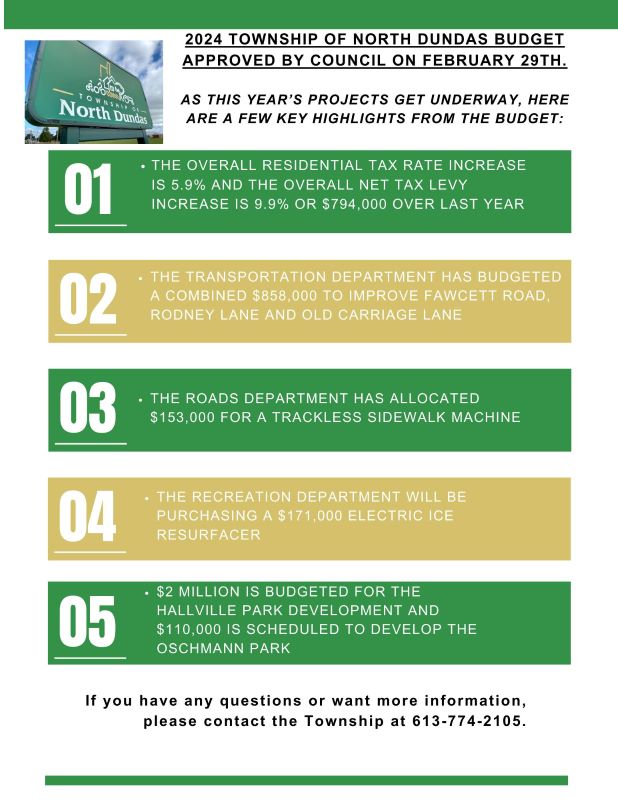For eager “release date” readers of the Times, the next meeting of North Dundas Council takes place today – March 21 at 1pm. Due to obvious timing conflicts, this Council meeting will need to be covered in the next issue of the Times.
There have not been any other meetings since the update on the February 29 regular meeting, in which Council approved the 2024 budget. Appended to this article is a poster on page 3 of this issue, shared by the Township with some key budget highlights.
 Following public outcry, the proposed tax increase was lowered. The original draft budget suggested a Township-portion tax increase of 14.68% over last year for residential properties. The final approved budget has a much lower increase of 9.86%. Since the Township’s cut of the total property tax bill is less than half, the effective increase – including the upper-tier Counties portion, and school support levy – sits at 5.9%.
Following public outcry, the proposed tax increase was lowered. The original draft budget suggested a Township-portion tax increase of 14.68% over last year for residential properties. The final approved budget has a much lower increase of 9.86%. Since the Township’s cut of the total property tax bill is less than half, the effective increase – including the upper-tier Counties portion, and school support levy – sits at 5.9%.
While it may seem as though lowering the tax increase by nearly 5% should have been a low-hanging-fruit solution to public concern shortly after the first draft budget was released, it’s not that simple. Such a large cut in tax revenue means that money must come from somewhere else. Municipalities can borrow limited amounts of money when needed, but unlike the federal and provincial governments, they must be able to pay it back in a set period of time. Meanwhile, the current federal debt in Canada sits at over $1.2 trillion, and continues to grow.
In the Township’s case, the deferral of some projects helped to balance the budget with a lower tax levy. Examples of deferrals include the Harmony Path project, a new generator for the Chesterville Fire Station, and some of the planned improvements to the Chesterville Arena.
The other method used to balance the budget was an increase in the amount of money taken from the Township’s reserves to cover projects. Almost $1.8 million will be taken out of the reserves, which is essentially a municipal savings account.
The Township is far from prospering financially, a fact which Council members seem to agree stems from North Dundas’ two arenas, two swimming pools, and other plentiful amenities serving a relatively small population. Council will undoubtedly have to continue pushing tax increases as high as public opinion will allow in the years ahead, in its attempt to get ahead of increasing expenditures and the installation and upkeep of new and existing amenities.
The March 21 Council meeting will be covered in the next issue of the Times.



